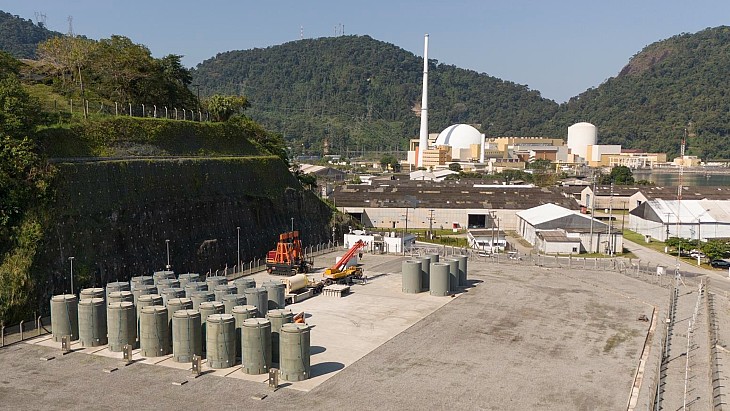Under a turnkey contract signed in 2017, Holtec of the USA supplied Eletronuclear with HI-STORM FW systems and related equipment for dry storage of used fuel from Angra units 1 and 2. Angra 1 is a Westinghouse-designed 609 MWe pressurised water reactor (PWR), while Angra 2 is a Siemens-designed 1275 MWe PWR. The units have different architectures and licensing bases, adding to the complexity of the project. Holtec modified their respective cask handling cranes and equipment for loading the fuel into the multi-purpose canisters and for moving the canisters to the dry storage facility.
The first campaign, which ran in 2021 and 2022, covered 15 of the Hi-Storm containers. Eletronuclear says the latest transfers to the Complementary Dry Storage Unit for Spent Fuel (UAS), which began in April, were completed last week, also with 15 Hi-Storm containers. The second phase of the current campaign is due to take place next year and will focus on Angra 1. By the end of that phase the aim is for 48 Hi-Storms to be stored.
The UAS is designed to receive fuel elements after the cooling process in pools at the plants. They are stored in canisters made of steel and concrete to guarantee safety. It is a system which is used in the USA and is designed to withstand extreme events such as earthquakes and floods.
The UAS includes physical security, radiation and temperature monitoring, an armoured access control centre and a storage warehouse with a technical workshop, designed and constructed by Holtec. The facility was constructed because the storage pools of both units were reaching full capacity. It is designed to hold up to 72 modules, with the capacity to receive used fuel until 2045.
Eletronuclear said in a statement announcing the progress update: "The process was carried out in full compliance with the most stringent safety standards, ensuring the protection of workers, the local population and the environment. Eletronuclear emphasises that used fuels are not considered radioactive waste, as they still contain significant energy potential that can be reused in the future. Countries such as Russia, France and Japan already have recycling techniques for this material.





_87299.jpg)
_52351.jpg)








